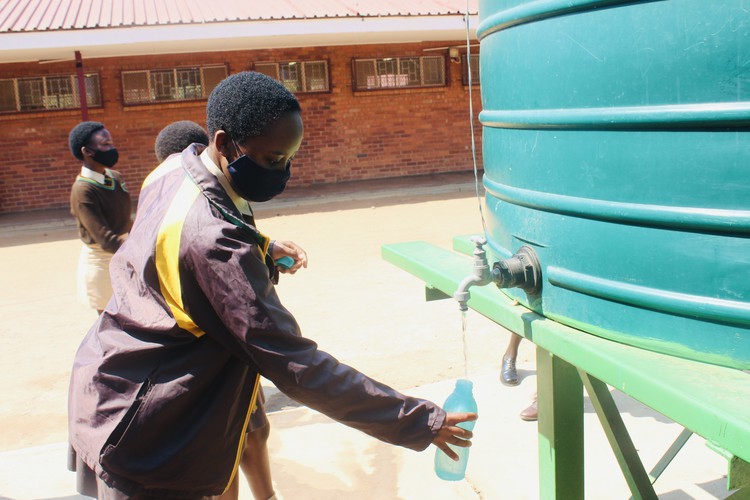Tshwane must stop violating Hammanskraal residents’ rights
Following the cholera outbreak in Hammanskraal, the City needs to comply with the Public Protector’s orders
Learners at Ratshepo High School in Temba rely on water trucked in every second week for drinking and cooking. Archive photo: Mosima Rafapa
Newly appointed Public Protector Kholeka Gcaleka has ordered the City of Tshwane to come up with a proper plan to fix the water challenges in Hammanskraal, north of Tshwane, in the next 60 days.
The Public Protector’s report, released on Tuesday, comes after a cholera outbreak in Hammanskraal in May this year which resulted in the death of at least 29 residents, with 166 confirmed cases.
In her Hammanskraal Systemic Investigation report, Gcaleka found the City guilty of failing to supply Hammanskraal residents with “clean water that is suitable for human consumption”.
“The lack of access to clean and potable water poses a danger to the lives of affected community members, constitutes a continuous gross inconvenience and improper prejudice to the residents of Hammanskraal,” Gcaleka stated in the report.
The spotlight on the cholera outbreak has dissipated, but the lives of many residents continue to be abnormal, as they are now forced to live without clean drinking water, and carry the financial burden of buying purified water to survive.
The cholera outbreak, and continued lack of clean water supply, is despite the South African Human Rights Commission in 2019 declaring the tap water in Hammanskraal unfit for human consumption.
And as far back as 2008, Hammanskraal residents complained about their tap water being discoloured and dirty. However, the City failed dismally to address the issue and decided to rather violate the Constitution, which unambiguously guarantees every citizen the right to access water.
The cost of accessing clean water
As part of its project documenting service delivery challenges across different municipalities, the Helen Suzman Foundation (HSF) visited several communities in Hammanskraal to check water challenges after the cholera outbreak. What we found were residents who have not only sadly accepted that their constitutional rights are trampled upon by the government, but many are also now forced to pay for access to clean water.
Some residents said they have to pay R40 for 10 liters of purified water every two days, which they use for cooking and washing. Shockingly, old age pensioners in Temba section are forced to use their meagre social grants to buy purified water from local businesses to survive.
Although the City delivers water daily as a temporary measure following the cholera outbreak, some pensioners told HSF they are not able to walk the long distances to different water collection points.
Also some residents are still reluctant to drink the municipal water, whether in the taps or trucked in, as they believe it was water supplied by the City which was the cause of the cholera outbreak, despite no conclusive evidence this was the case.
The way forward
The City has committed a budget of R450-million over the next three years for the upgrade and refurbishment of the Rooiwal waste water treatment works, which is the main source of Hammanskraal’s water problem.
It is, therefore, the responsibility of the city manager Johann Mettler and the executive mayor Cilliers Brink to ensure this budget plus the R60 million operational grant from the Development Bank of South Africa is utilized to upgrade and refurbish the Rooiwal wastewater treatment works, as directed by Gcaleka.
However, having seen how the residents, and the elderly in particular, continue to have to pay for access to water, a short-term solution is needed to relieve them from this unnecessary burden.
The City must ensure its trucks water to every street, and not just to designated water points, which disadvantages elderly people who cannot walk long distances. A caring local government would ensure elderly people in sections such as Temba have water delivered to their homes on a regular basis, and do not have to spend their grants to buy clean water.
While most of the residents have given up hope that the promises made during the outbreak will be kept, Gcaleka has given mayor Brink just 60 days to ensure the implementation plan of phase 1 of the Rooiwal wastewater treatment works refurbishment and upgrade project is adopted by the Tshwane council.
HSF will also keep a close eye on the budgets allocated to the refurbishment of the Rooiwal project, ensuring they are monitored and accounted for.
It can no longer be acceptable that the government continues to violate the constitutional rights of poor people of Hammanskraal and put their lives in danger.
Views expressed are not necessarily GroundUp’s.
Next: RDP houses left incomplete for eight years
Previous: Cable thieves target Mangaung townships during loadshedding
© 2023 GroundUp. This article is licensed under a Creative Commons Attribution-NoDerivatives 4.0 International License.
You may republish this article, so long as you credit the authors and GroundUp, and do not change the text. Please include a link back to the original article.
We put an invisible pixel in the article so that we can count traffic to republishers. All analytics tools are solely on our servers. We do not give our logs to any third party. Logs are deleted after two weeks. We do not use any IP address identifying information except to count regional traffic. We are solely interested in counting hits, not tracking users. If you republish, please do not delete the invisible pixel.



